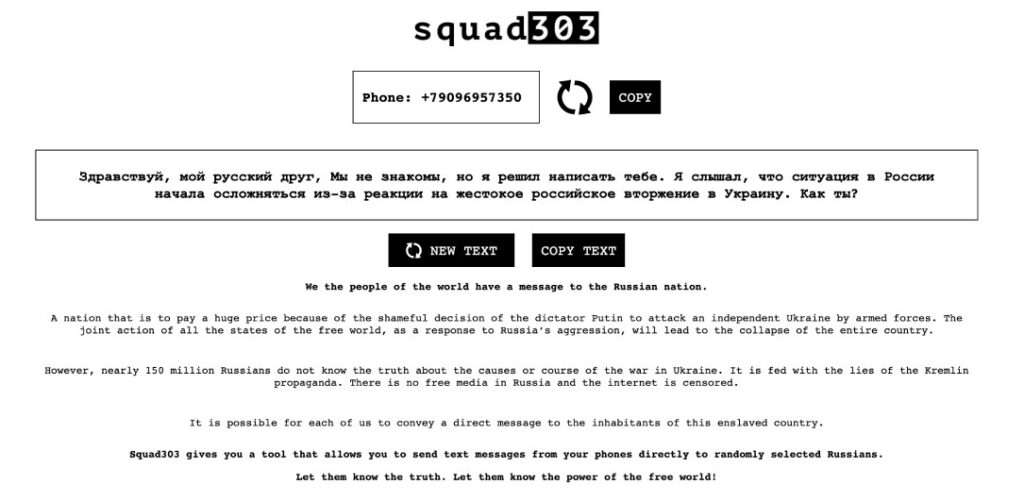‘We are unstoppable': How a team of Polish programmers built a digital tool to evade Russian censorship
Over the last two weeks, as the Kremlin has increasingly tightened its control on independent media and censored news about its invasion of Ukraine, people around the world have used a new tool to send messages to random Russian citizens about the reality of the ongoing war.
The tool was developed by a team of Polish programmers, The Wall Street Journal reported earlier this week, who obtained tens of millions of phone numbers and email addresses tied to Russian users. People can randomly message users in the database, or send pre-drafted messages in Russian.
The Record reached out to the group, which calls itself Squad303, with questions about their efforts on Monday. The group was slow to respond — it had been fending off a distributed denial-of-service attack, while trying to manage a massive influx of users who had read about the tool from various news outlets. A representative of the group replied, saying they would reach out soon. After three days of follow-ups, the representative called Wednesday evening using the encrypted messaging app Wickr. His video was on, but his face was covered by a black mask and he appeared to be standing in front of a white wall. He spoke in English with a strong accent.
The representative talked about the group’s background — Squad303 refers to a British Royal Airforce Unit comprised of Polish pilots who assisted in the Battle of Britain during World War II. The group signs email correspondences with the name ‘Jan Zumbach’ — a Polish-Swiss fighter pilot from the war — and the group’s original domain ‘1920.in’ references outnumbered Polish forces who vanquished a Soviet invasion during the 1919-1920 Soviet-Polish War. The conversation below has been lightly edited and condensed for clarity.

The Record: Who is ‘Squad303’ and how did this tool come about?
Squad303: We started as a group of friends, a Polish group of friends. Cybersecurity and communication experts. We started 12 days ago. Now we have a team of almost 100 people from different countries. From Estonia, Kyiv, Ukraine, Russia, the UK, Germany, France, Poland, and the States. We have a lot of people from the States. We have people from South America and even one from Japan. So, it's growing very fast. And at the moment, the biggest challenge is to try to manage it somehow. You know, we are in different time zones, different people, people we don't know. It's a challenging project and we are super exhausted, but super happy at the same time because we know that it is scaling up and growing every single day. We have more and more traffic flow and more and more people sending text messages, WhatsApp messages, and emails to randomly selected Russians. When war broke out — like many millions of people around the world — we wanted to help. We realized that we would do the most if we used our skills and experience.
This is how the first version of our website was created, which allowed us to send text messages to randomly selected Russians. Over time, other versions were created: to send messages via Whatsapp and email.
We do not know how to start this tweet... how to say HOW MUCH WE YOU!
— squad303 =www.1920.in #Anonymous (@squad3o3) March 16, 2022
Y-O-U sent 30,000,000 messages to randomly selected Russians via https://t.co/SOF3exu83O ! #fightforUkraine Don't stop! You are F*KN INCREDIBLE!!!❤❤❤#OpRussia #Anonymous #Ukraine @YourAnonNews @donie pic.twitter.com/niU6MgJGoe
TR: Is the group still primarily based in Poland?
Squad303: The core team, yes — the founding team. We are trying to use our supporters, our global members, to focus on development and communication. And thanks to them we don't have to think about many things. They have tasks and they deliver. So it looks like we are on a good path.
But imagine that you're building a company from zero to millions of customers, in this case, within twelve days. Your team is drawing from a few people to almost hundreds and you work in every single time zone on the planet, and during the day you have to go to your office to do something to earn some money.
TR: Do your members know any identifying information about each other? Or do you remain anonymous to each other?
Squad303: In terms of the core group, yes, we are friends, so we have known each other for years. In the case of all these people and the people who support us, we do not know their names. We do not know their phone numbers. We have special groups of defense communicators. But it is anonymous.
TR: How do you select information and how does it appear to the recipients?
Squad303: It is the broadcasters who decide which way they want to contact the Russians. They can choose between text messages, WhatsApp, and email.
The first messages were our idea, but now we are working with professionals in this type of communication. We will continue to make significant changes in the content of the messages. They will be much more friendly. In each case, our tool suggests the content of the message. In the case of emails, we encourage users to send Russians an open letter written by scientists from the Russian Academy of Sciences and signed by 7,000 scientists. A letter condemning the war started by Putin. The authors of this letter cannot send it themselves because they were arrested and the letter was removed from the Russian Internet.
TR: Do you receive funding from any organization or are you backed by one?
Squad303: No, we have funds to finance these projects at the moment. It's going to be much more challenging soon because we started with just one server and at the moment we have 16 servers and it's still not enough. In the future, we may need funding but we can't worry about that now. Every single day we get dozens of messages from people who would like to support us some way or another but at the moment we don't need funds — we need sleep.
TR: What happened today?
Squad303: Today we had another Russian DDoS attack. At the moment we are cloud protected, so It's not a problem for us. On the other hand, we have a growing body of evidence that the Kremlin is trying to fight back to stop us.
This is the most important news for us because we know that we are successful. The project is a trouble for the Kremlin. We know that we are in a good place. What does it mean that we have proof of this? It means that yesterday we noticed that they started a censorship program on a network level which means that all Russian protocols are involved. It means that there is a decision-maker somewhere who is able to force them to do this. Since yesterday, we know that they are filtering messages we send to Russia. So basically for maybe 60 minutes, every single person from the world, who sent pre-defined text messages from our website, the messages didn't send due to the size of the program in Russia. Receivers got only a hash sign, nothing more. When we noticed it we changed all of our content — every single pre-defined text message. We've got new content and at the moment we have monitoring, which lets us know if they filter more messages. Then we can change the message once again.
So, you know, they're chasing the rabbit. They try to catch up but they are too slow. At the moment It looks like they need six hours to implement new content so every six hours we need to change text messages so they can successfully deliver to Russia.
TR: Did you expect that the tool would take off like this?
Squad303: No, we did not [laughter]. It was something amazing to see all these people. We thought that there are people on this planet who would like to engage, who would like to support Ukrainians who would like to fight. We knew that they can't buy guns and shoot Russians, so we came up with this idea for them to engage, to be a part of Operation Russia, but we didn't know. It was something amazing.
TR: How has the maintenance been managed?
Squad303: You know, it's every single morning I swear to it. At the end of the day, It's not about us, we created just a simple tool. It's about the movement. In the past, you could read about Anonymous and you could hate them or love them or admire them, but you couldn't join them because you're not a programmer, for example. Now we know that every person on the planet could join Anonymous using our tool and it's an official communication line created by and accepted by Anonymous. So we have changed the way people interact with Anonymous. Before it was only about hacking, and now it's about communication. Our project is a non-violent information operation. You don't have to be a hacker.
Soon we will release a new feature, allowing people to call randomly selected Russians. We are trying to build more and more communication channels for people to interact with Russians in different ways. It's not a one-way communication project. We believe that we're building communication bridges between people from the free world and people from Russia. Every text message delivered to Russia is a gateway even if they do not write you back instantly. They are able to do it in a day, a week, a month.
Russia cannot stop us — they cannot cut off the communication network. So hopefully one day we have all their smartphones infected with messages from abroad and can change something for the country.
[Editor’s note: Sqaud303 shared its allegiance to Anonymous and other subsets of the well-known collective on Twitter Tuesday — signing an open letter directed at Putin and other Russian officials as well as a press release to the public.]
We are coming for you #Putin.
— squad303 =www.1920.in #Anonymous (@squad3o3) March 15, 2022
We are legion,
We do not forgive,
We do not forget.
Expect us. #Anonymous, #GhostSec (@GS_M4F14), #SHDWSec (@shdwpnda) and #Squad303(@Squad3o3)
Open letter: https://t.co/bvQmnipu5m
Press Release: https://t.co/TtrJGWnSI7 #OpRussia pic.twitter.com/WtixP79CEl
TR: What challenges are you expecting in the weeks and days ahead? Will they get worse?
Squad303: It's hard to plan anything because every day brings new challenges. Today it took six hours, tomorrow we don't know what's going to happen, but we have to be ready.
We are open-sourced, meaning that we share the source code of the truth with others at the moment. It's been one of the most popular sources on GitHub, and GitHub is the most popular platform for sharing source code. There are hundreds of programmers around the globe working on similar tools with the same possibilities — tools in different languages, tools for different communities, different nations. We are like a virus. We are unstoppable.
Emma Vail
Emma Vail is an editorial intern for The Record. She is currently studying anthropology and women, gender, and sexuality at Northeastern University. After creating her own blog in 2018, she decided to pursue journalism and further her experience by joining the team.


